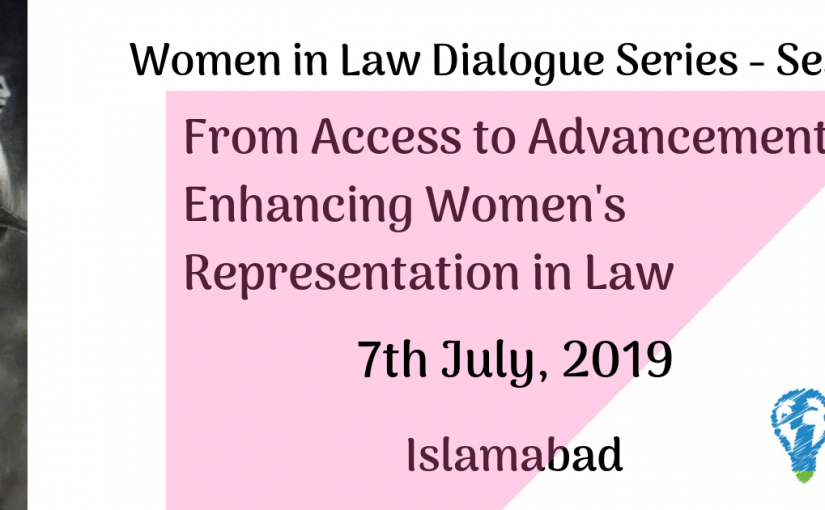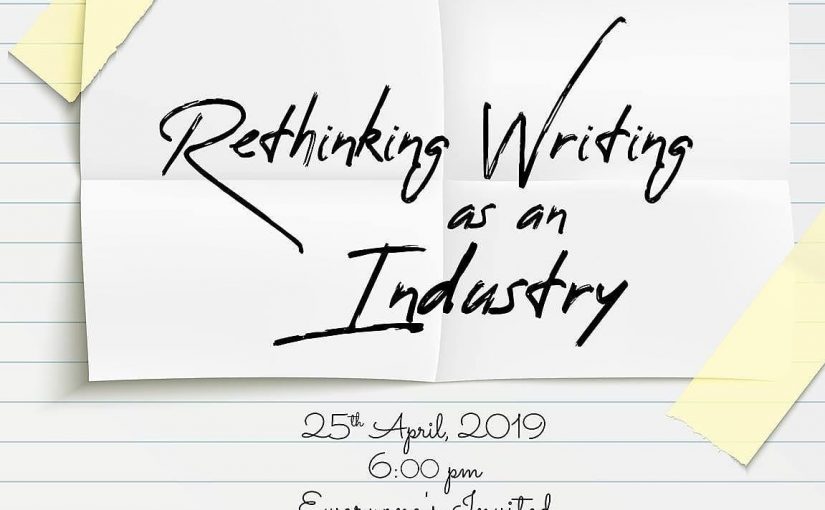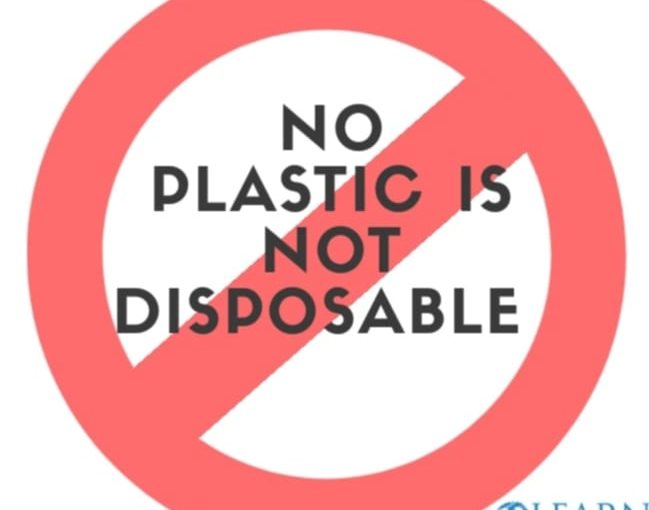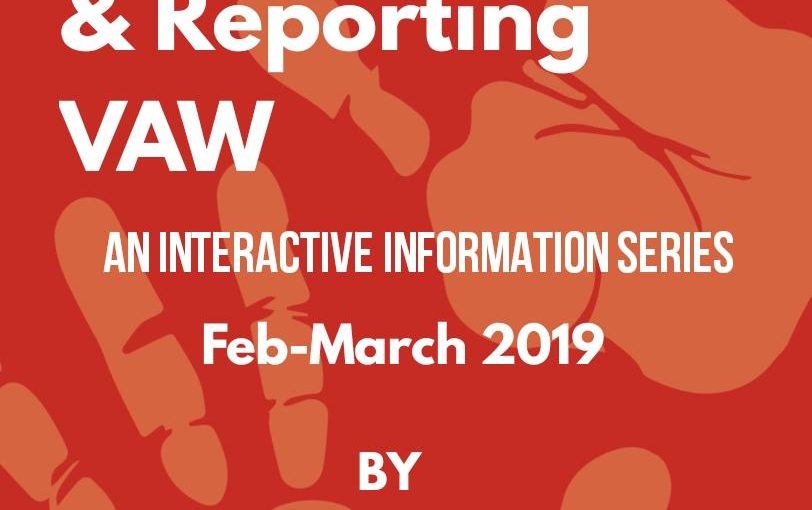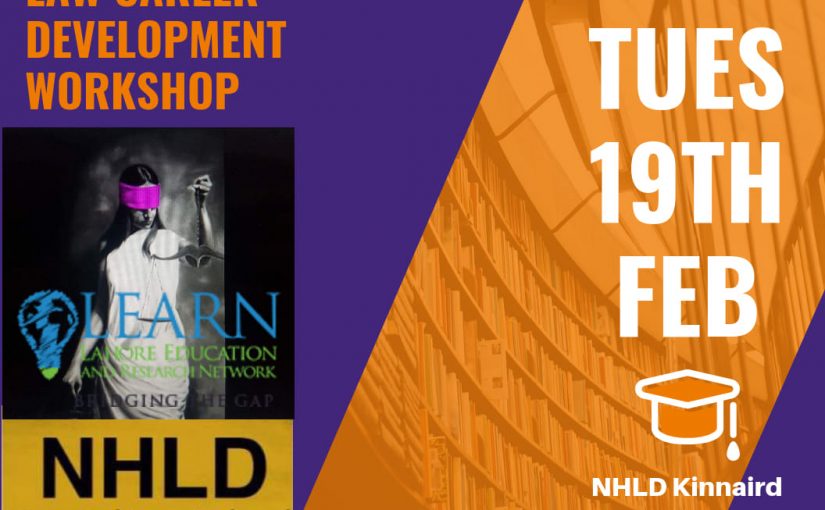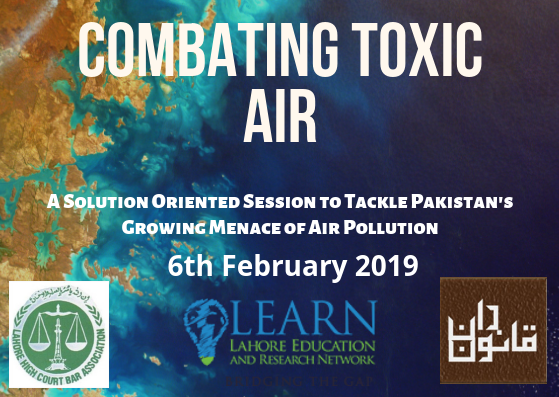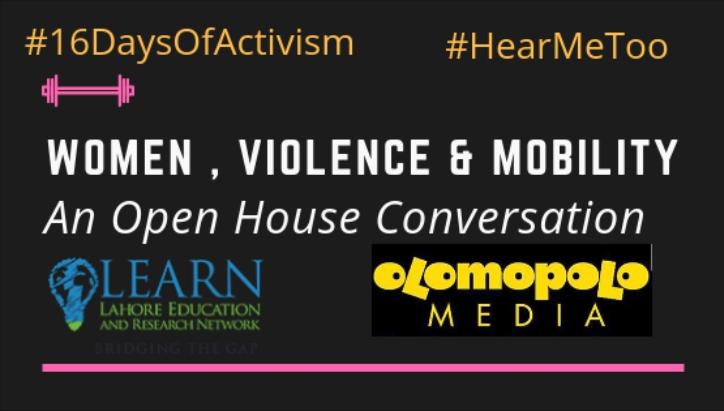Press Release: Women and Writing Session 3 | Rethinking Writing
23rd August 2019 | Lahore.
On August 23rd, 2019 Lahore Education and Research Network (LEARN) conducted the third session of their ‘Rethinking Writing’ Initiative in association with Olomopolo media in Lahore.
The session aimed to focus the particular challenges faced by women as writers and why it is important for them to continue to write and reclaim their space nevertheless. The driving question behind the session was whether writing was a means to counteract erasure and if so, how can women continue contributing their voice to their issues for their cause?
The panel consisted of, Ms. Sana Munir (author of ‘Unfettered Wings’), Ms. Shabana Mahfooz (freelance Journalist, writer and trainer), Ms. Nasira Zuberi (Urdu Poet and Media Person), Ms. Sana Asif Dar (BBC Urdu Journalist), Ms. Sabahat Zakariya (Journalist/Feminustani) and Ms. Naima Rashid (Author/Translator). In this way, the panel was composed of senior and junior writers, poetess, translators, journalists and media persons, who each had their own journey to share and narrate.
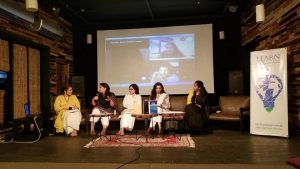
Ms. Waiza Rafique, who herself is a poet and has recently started writing in addition to her day job as a lawyer and whose work has been published by ‘Rekhta’ and who is a member of LEARN and part of the Rethinking Writing Initiative, opened the session with her welcome note and introduced the panelists. Thereafter, Ms. Nida Usman Chaudhary, founder of LEARN and its various initiatives commenced the session with a tribute to the legendary ‘Toni Morrison’ who passed away on 5th August 2019, leaving behind a legacy of her own.
She personified the essence of the session on women in writing and has been a source of inspiration and reflection for most writers after her. In particular, her contribution to her community of African-American writers and in giving them a voice of their own lies her true contribution and also helps us understand why it is so important for people from marginalized groups and communities, including women to reclaim the platforms which can be their voice and the window for the world to see their journeys, their stories, their struggles, their triumphs and their successes.
In honouring Toni Morrison, a short video presentation of her most inspiring quotations from her celebrated work was shown. Such is the power in writing, it transcends boundaries and geography, race and nationhood and truly connects the person reading to the emotions common to us as humans. In this way, writing brings down barriers.
The session was divided into four sub-themes including, Women and Creative Writing, Women and Media, Women and Journalism and Women, Literature and Performing Arts.
The conversation opened with Ms. Nida asking Ms. Sana Munir about what motivated her to write and in particular, what was the inspiration behind her columns on Mughal Women for a national newspaper to which Ms. Sana replied,
“my curiosity in digging out the stories of Mughal women arose when I visited the old historical buildings in and around Punjab. There was hardly any story being told about Mughal women and even in the history books their role was reduced to being, at best a ‘love interest’ of the Mughal princes and kings. Clearly, their entire legacy as people, as persons, as humans had been erased or never documented. The women were much more than an eye-candy and so I felt as a woman, as an author it was important to represent them and their true achievements because history had not done justice to them, their contribution and their achievements.”
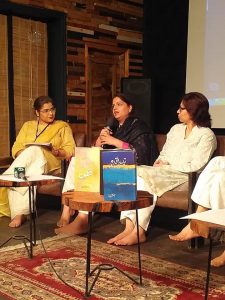
Ms. Naima Rashid, who translated Parveen Shakir’s poetry in English in her book, “Defiance of a Rose” held similar views when asked why she decided to translate Parveen Shakir’s work into English. In addition to the obvious answer of accessibility of her work to people who could not understand the language of the original work, Ms. Naima shared a very thought-provoking observation about Parveen Shakir’s perception and the actual scope and sphere of her work. She argued that Shakir was always portrayed as a poetess who wrote about love and emotions, whereas the multifaceted layers of her work in other streams and aspects was also a victim of the similar kind of erasure that Sana talked about. She felt it was not just to let that perception continue about someone as versatile and diverse as Parveen Shakir and so as her fan, as a woman she felt she should translate and bring focus on those works of the late poetess to do justice to the true essence and sphere of her work. She believes translation can be a means to fight war against amnesia and help highlight those aspects of women’s work and their contribution to the society that have traditionally been sidelined.
On the side of journalism, Ms. Sana Asif Dar expressed her concerns over the gender stereotypes that persists in her field and in the challenges she faces at work. She highlighted how it is presumed that she would cover stories that are considered softer or weaker such as those related to domesticated, family, or women and children related issues or lifestyle, fashion and showbiz related news while the ones considered more serious or critical such as current affairs, economy, political scenario, terrorism and international relations be reserved for male correspondents to cover. She also highlighted the challenges of working conditions and lack of safe transport which limits her possibilities as a female journalist in a country like Pakistan where social conditions are not conducive for women to be in the field. Another point she highlighted was that very few women were operating at decision making levels in her profession and that affects the kind of stories that get picked for broadcast or publication, in that, women-centric concerns may not get as much attention as ideally desired.
This was a point that was further illustrated by Ms. Sabahat Zakariya who shared her experience with us and said that there was once a book she pitched to various contacts and people in the publishing industry as well as among her circle and colleagues. What intrigued her was the common response that was coming from men and women towards the importance of publishing such a book at all where in the women considered it very important while the men, not so much. It goes on to show that female voices are lacking at the top where the decision making takes place and that is why stereotypical notions and gender roles in our content continues to be perpetuated and characters like ‘khirad’ continue to glamourize a subservient eastern woman as the ‘good’ woman and vilifies the one who can speak up as ‘the bad’. Our neighbours have increasingly experimented with powerful scripts, with powerful female characters and have explored digital platforms as well as the more traditional cinema and TV channels to bring progressive content, even path-breaking content which helps to reform the society’s narrative of the helpless princess in need of knight in shining armour to one that is more in tune with the modern-day woman who is a person in her own right. Sabahat stressed that it was not enough that more women write and reclaim space in this industry, but that it was important that whichever gender does fill in that role, is a feminist in his/her approach to expect a change in real terms and to make a move towards empowering and a progressive narrative building re women.
In addition to erasure as a challenge, journalist Shabana Mahfooz highlighted other challenges that women writers face in Pakistan by virtue of a patriarchal set-up of the society and stated that it is more challenging for the woman to be able to write when she wants to and how she does because she is expected to be available for her domestic responsibilities prior to her taking the time out for any ‘interests’ she may have including writing. In that, it is more difficult for her to get recognition as a professional writer as compared to her male counterparts. She however very rightly stated that there were some feelings and experiences which women face and those experiences can be better expressed by women themselves, such as child birth, pregnancy, miscarriage, domestic violence or even love for that matter, in that, in the way she perceives it or feels is, is going to be very different from a male counterpart so it is important that all aspects, all expressions find their way to people and the readers have a spectrum of voices to connect to.
Ms. Nasira Zuberi, an esteemed poetess and a media person who has been behind launch of two news channels in Pakistan added that women should be encouraged to see beyond their gender and be trained to view themselves as professionals to be able to bridge the gaps that may persist in their writings, in their content or in them facing their challenges in practice. Given the many avenues that have opened up in modern day and age, it is not possible any more to suppress a voice that dares to take a stand. She encouraged young writers to explore writing outside their comfort zones and to hone their skill through practice, consistency and commitment. From her point of view,
Pakistan has come a very long way and that there are many women who are now part of the industry and not just in the showbiz, media or writing, but in departments, in all professions, women have made their presence felt and are doing remarkable work.
She believes that while advancement is clearly needed in terms of increased slice in decision making, women’s courage, persistence and their presence is already a very encouraging trend that needs to be applauded, supported and encouraged. She ended her conversation with her poetry she wrote for women’s day on the juggling that women must do in order to go forward.
To close the conversation, Waiza Rafique shared the message her mentor taught her and said that, “writing, or any other form of art for that matter, chooses hearts itself.” The session ended with a recitation by Mr. Ali Mazhar from ‘Ain Adab’, who had also written a couplet in honor of women for women’s day 2019, the text for which is as follows:
نئی عورت کی تَلاش
کبھی عورت کو دیکھا ہے ؟
نظر دوڑائی ہے ، تم نے کبھی ؟
تمہارے چار سُو ۔۔ تُم کو ۔۔
کوئی “عورت” نظر آئی کہیں ؟
کہ یہ جو رشتے ناطوں کے
سادہ ، سُتھرے ، گنُجلوں میں اُلجھے بندھن ہیں
کبھی اِن کو ٹٹولا ہے ؟
تمہارے دل میں، گھر میں ، دفتر و بازار میں
جو ہَستی ۔۔۔۔ بَستی ہے
کبھی دیکھا ہے تم نے غور سے اُس کو ؟
کیا وہ عورت نہیں ہے ؟
کہ جس کی کوکھ سے، نِکلے تھے تم
کہ جس کی مانگ میں، نِکھرے تھے تم
کہ جس کی ہمت و بازو، بَنے تھے تم
کہ جس کی نَنھی مُنی خواہشوں کو ۔۔۔
اپنے کاندھے پر اُٹھائے، اپنی پَلکوں پر بِٹھائے، چلے تھے تم
سُنو !
یہ جان لو اب تُم
کہ اُس کی ذات کا رَستہ ، نہیں سَستا
کہ تم اُس سے ہو
اور وہ ، تمہاری ذات کا حِصّہ
کہ جس کی کھوج میں ہو ۔۔
اور جسے تم ڈھونڈتے پھرتے ہو
کہیں اوجھل نہیں ہے وہ
تمہارے سامنے ہے ، صاف آتی ہے نظر
بس، اپنے آپ میں گم ہے
تمہاری چھاپ میں گم ہے
ذرا تم اپنی آنکھوں سے
تعصب ، برتری، مردانگی اور انا کا
بھاری بھرکم موٹا سا چشمہ ، ہٹاؤ تو
وہ اپنی سوچ رکھتی ہی ، کسی کو یہ بتاؤ تو
کہ جس کو ڈھونڈتے ہوتم
فسانوں میں، زمانوں میں
کبھی بے زار لمحوں میں
کبھی خالی مکانوں میں
وہ جیتی جاگتی ہے
سوچتی بھی ہے ، سمجھتی ہے
کے جس کے دم قدم سے
زندگی آباد ہے آدم
تم اِک لمحے کو اُس کی سوچ کے پہرے ہٹاؤ تو
نئی عورت ہے وہ ۔۔
تم یہ تو سمجھو اور سمجھ میں اُن کی آؤ تو
برابر ہے ، برابر ہو ، برابر تم کو رکھنا ہے
نئی عورت تو ہے، تم کو، نیا اک مرد بننا ہے
نئی عورت تو ہے، تم کو، نیا اک مرد بننا ہے
علیؔ مظہر
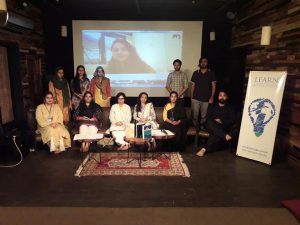
Press Release – Women in Law Islamabad Chapter Launch | 7th July 2019
The fifth session in the ‘women in law dialogue series’, titled ‘from access to advancement: enhancing women’s representation in law’ was conducted by Lahore Education and Research Network in Islamabad on 7th July 2019.
Women in law dialogue series was launched in Lahore in 2016 with the objective of highlighting the challenges and opportunities faced by female lawyers in the legal profession and to understand and address their barriers to progression in this field.
Whilst previous sessions laid the ground for access, equality, inclusion and diversity in the legal profession, session 5 was focused on advancement, progression and representation of women in the field.
“We launched the series in 2016 to provide a platform for female lawyers to come together to address their common challenges, however, since then, the series have grown into an initiative on its own and we felt that having talked about access and inclusion, it was important to address the glaring disparity in more representative positions within the profession that occur at a more advanced stage.” said Nida Usman Chaudhary, the founder of the initiative. “At present, only 5 out of 106 judges in various High Courts across the country are female, women hardly reach senior partner level positions in law firms and you seldom see them practice in areas such as criminal law which are considered hard.” she added.
Former Chairperson of Competition Commission of Pakistan and Founding Partner of Hassan, Kaunain and Nafees Advocate and Consultants, Ms. Rahat Kaunain was among the panelists. She encouraged female lawyers to see themselves as a ‘professional lawyer’ as opposed to their ‘gender’ because the more conscious you are of the fact that you are a woman, the more uncomfortable a male dominated place could make you feel. “There are three barriers to advancement in my view, you, your boss and your family” she added.
“There are three barriers to advancement in my view, you, your boss and your family” – Rahat Kaunain
Other panelists included advocates Benazir Jatoi, Amna Abbas, Minahil Khan and Huma Jamil Babar.
Advocate Benazir Jatoi highlighted that the “disparity is so high that any reform or change towards advancement has to come through policy and affirmative action.”
“disparity is so high that any reform or change towards advancement has to come through policy and affirmative action.” Benazir Jatoi
Advocate Huma Jamil Babar, who practices criminal law, an area which very few women pursue, explained the kind of physical and mental stress that comes with practicing in such a hard area. She felt, many women shy away from such fields because of the nature of such area of practice for which women in our society are not prepared socially. She however stressed that if you are good at what you do and are committed, you will fetch clients and you will progress.
During the round of open discussion, Jugnoo Kazmi, a lawyer working under the Supreme Court clerkship programme highlighted that prior to their demanding it, there was no bathroom at the Supreme Court Building which was for women. “The clerkship programme which caters to inclusiveness and attempts to hire equal number of male and female candidates in the programme has made a difference in the attitude of the staff in the Supreme Court as well who have now begun to accept us women in the workplace., therefore, affirmative action does help make the environment more conducive and inclusive for all” she added.
“There were no bathrooms for females in the Supreme Court building” – Jugnoo Kazmi
Secretary of Islamabad High Court Bar Association, Mr. Umair Baloch attended as a Guest of Honour. On behalf of Islamabad High Court Bar Association, Mr. Baloch welcomed the initiative to Islamabad and offered to support the cause in his own capacity wherever he could. He encouraged more women to come forward and practice and agreed that female lawyers had their unique set of challenges that should be addressed.
MNA Shandana Gulzar Khan graced the occasion as the Chief Guest. She shared her personal journey in law and identified that many issues that women face in this profession were not limited to the legal profession but that they were part of the bigger social challenges which need to be resolved. “The issues identified today need to be categorized as whether they are law and policy issues, institutional or structure issues or general social issues and only then can proper solutions and way forward towards their reforms could be brought” she added.
The women in law present culminated the session with a resolve to push for three policy level changes, (i) affirmative action for parity for greater representation at bench, bar & senior managerial level position, (ii) an enabling environment sensitive to needs of female lawyers, including day care facility, maternity benefit and leave and separate bathrooms etc and (iii) mentorship and training of young lawyers, particularly women.
The event was well attended by lawyers, practitioners, students and development experts from Islamabad, Rawalpindi and Attock Bar.The session further marked the launch of the Islamabad Chapter of the women in law initiative which will result in further sessions being organized in the capital under the initiative.
Press Release: Session 2 #RethinkingWriting – Writers Meet and Greet | 21st June 2019
Press Release: Writers Meet and Greet | 21st June 2019
In furtherance to its campaign titled #RethinkingWriting as an Industry, Lahore Education And Research Network (LEARN), in collaboration with Olomopolo Media, organized its second session – a Writers Meet and Greet on 21st June 2019, Friday at Olomopolo Media, Lahore. The first session was held on 25th April earlier this year.
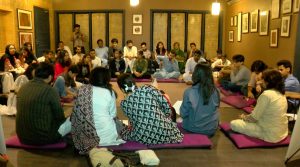
Various budding creative writers, poets, dramatists and other literary figures participated in the session and presented their work in both Urdu and English Language. The session aimed at connecting young writers within the literary circles and sharing opportunities with them in order to promote them as writers.
The session was graced by the presence of renowned journalist and writer Shabana Mehfooz and Poet Ali Mazhar from Ain Adab. Both the guests not only enjoyed the reads by participants but presented their own writings as well.
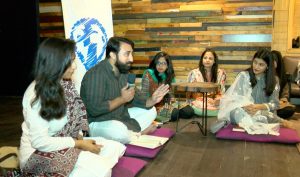
While explaining the purpose behind the initiative, the founder of Lahore Education and Research Network, Nida Usman Chaudhary said, “Pakistan has a very vibrant underground writing culture and through this initiative, we not only wish to provide the platform to our creative pool of budding writers but also aim to change the mind-set towards writing from a hobby and art to it being seen as an industry. There is so much potential that can be explored in this domain and we are working hard with stakeholders on a multidimensional basis to make them understand and see value in supporting and promoting our own stories, our authors and their exceptional work.”
Of the young writers participating in the event, the youngest Mahnaz Mir is only 13 years old and is awaiting release of her first novel by Rupa Publishers in December this year. Other young writers who presented their work in the session included Komal Bhatti, Abdul Wahab, Abdullah Kassar, Mumtaz Mir, Rabeea Hayat, Mariam Saeed Khan, Muaaz Hameed and Aisha Hamid.
While encouraging the young talent and appreciating the efforts by LEARN and Olomopolo, journalist and writer Shabana Mahfooz said, “I would encourage you all to read as widely and broadly even though it may not be the genre that you are comfortable writing on and about as it gives depth and allows for a deeper understanding of the craft. Not only does it improve vocabulary and expression but it also helps build ideas and provide exposure and build your thought process.”
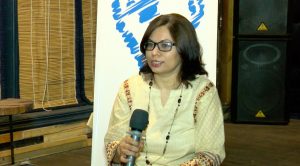
She summed up her closing speech with a few words from her article on freedom of expression. The participants thereafter engaged in an open house conversation. Effort was made to keep the session inclusive with people from diverse backgrounds and age groups participating to share their content.
“It was heartening to see how the youth of this country was able to put into beautiful, thought provoking and inspiring words some of the most pressing issues facing our society including Farishta’s case, the crisis in tharparkar, income inequality and even sexual objectification and violence against women” added Nida Usman Chaudhary.
Further sessions under the #RethinkingWriting initiative will follow.
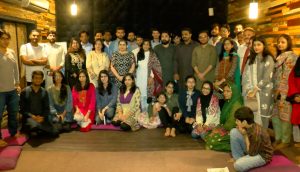
Press Release #RethinkingWriting Initiative Launch | 25th April 2019
Initiative launched in Lahore to Rethink ‘Writing’ as an Industry
To celebrate the world book day 2019, Lahore Education and Research Network (LEARN) in association with Olomopolo Media launched an initiative to ‘Rethink Writing as an Industry’ with a panel discussion in Lahore on Thursday, April 25, 2019.
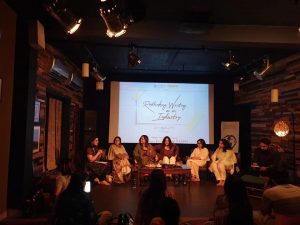
The discussion aimed to focus on the challenges faced by writers and publishing houses in Pakistan and attempted to address the important question of what the stakeholders both, within the government and from the business and trade community could do in order to promote it duly as an industry.
“We must ask ourselves if Pakistan is losing out on an entire industry and revenue by not investing in its writers and therefore also losing out from capitalizing on related industries such as showbiz?” said Nida Usman Chaudhary, founder of LEARN. “The west and Bollywood have both been able to gain a lot in terms of box office revenues from movies and series which have been based on novels. We have seen a trend of such movies doing superbly well at the box office and their resulting contribution to the GDP. There is therefore, business potential in ensuring that the world hears our stories and falls in love with them as well.” She added.
The event opened with a recital of original verses by lawyer, poet and a member of LEARN Waiza Rafique, through which she paid a tribute to the authors of the sub-continent.
The panel of speakers included Faiqa Mansab author of ‘This House of Clay and Water’, Laaleen Sukhera, editor and co-author, Austenistan, Zarminae Ansari, founder of ‘Joy of Urdu’, Naima Rashid author, poet and translator, Shabana Mahfooz journalist, trainer and content writer, Zahra Ali Khan writer and lawyer and Awais Khan founder of the Writing Institute. The President of the Women Chamber of Commerce and Industry, Faaiza Amjad was the Guest of Honour.
“There are no literary agents in Pakistan and our writers are under-represented in the global market” said Awais Khan through a video message.
Further challenges faced by writers were highlighted by the speakers as well as by the members in the audience who shared their own experiences of lack of opportunities and information on how to proceed forward with their creative work. “No formal trainings or resources were tere to guide or channelize those who wished to pursue creative writing” said one of the members of the audience who uses a digital platform to publish her work.
“There is no institutional framework or platform through which the work of our writers can be facilitated and promoted in foreign markets. The government and the chamber of commerce should facilitate through subsidies” suggested Faiqa Mansab.
“Producing books of international quality is also a challenge because printing paper and cost of doing business is very high in Pakistan” explained Laaleen Sukhera.
On the lost opportunity to capitalize on the demand in international markets of Urdu, Zarminae Ansari said, “There is no research or effort into promoting Urdu as a language to foreign markets possibly due to lack of appreciation and understanding towards the demand for Urdu that exists outside Pakistan.”
“There is a lot of work that goes into a translation to ensure that the true meaning of the author’s work is not lost in translation, but currently, there is no respect for the work we do as translators.” said Naima Rashid.
“It would be hypocritical of us to try and inculcate love for reading in our children if we are unable to show them a future in and through writing.” stated Nida Usman.
The event closed with a recital of ‘kitabein Jhankti hain’ written by Gulzar saab and performed by Ali Mazhar of ‘Ain Adab’.
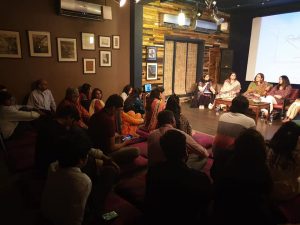
Plastic is Not Disposable Campaign
13 May 2019
We launched our campaign against #SingleUsePlastic last year. Last year the campaign called for ditching at least one single use plastic item such as straws, plastic bags or cling wraps.
This is our 2nd year of campaign for this cause. It commences from today.
This year, it is about changing mindset of people regarding plastic products such as bottles, cling wraps, straws and bags which are considered “disposable”. We are advocating for the word ‘disposable’ to be disassociated with plastic products to create better awareness of its non-biodegradable nature.
Join us and spread the word using hashtags:
#KnowYourPlastic #PlayYourPart #NotDisposable #Plastic
Understanding and Reporting VAW
We are happy to announce our collaboration with Chief Minister’s Strategic Reforms Unit (CMSRU) to deliver joint workshops on “Understanding and Reporting Violence against Women”.
Pursuant to our Resolution on Gender Based Violence adopted by our Women in Law Initiative Pakistan on 15 Sept 2018 at the VAWCON18, we are committed to raising awareness about this matter and this series is in furtherance of our commitment to the same.
Combating Toxic Air | Wed 6th Feb 2019 | Lahore High Court
Do you want to be part of the solution of the greatest challenge facing our existence? If so, join this session this wednesday at the Lahore High Court’s Karachi Shahuda Hall.
Time: 2:30 pm onwards.
#LahoreSmog #ToxicAir
https://www.facebook.com/events/406819460056379/
Women, Violence and Mobility – A Conversation (Event Report)
On Friday Dec 7th, 2018, Lahore Education and Research Network (LEARN) conducted a very engaging session in relation to #16DaysOfActivism for ending gender based violence in association with Olomopolo Media in Lahore.
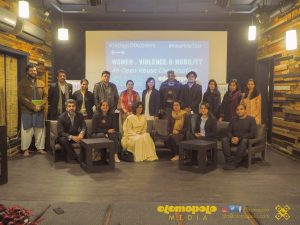
The theme on which we decided to focus on was ‘Women, Violence and Mobility’ in order to shed the light on the challenges while commuting faced by women and vulnerable groups and how that in turn consequently affects or undermines other rights that they have in the constitution such as their right to work, their freedom of movement, access to basic facilities etc.
We had an open-house styled panel discussion where our speakers engaged in a two-way dialogue with the participants and shared not just their stories and experiences but also insights from their work and initiatives that they have undertaken on their own accord to bring awareness on women’s right to mobility and their right to be in public spaces.
The panelists included,
a. Rafay Alam, a renowned environmental lawyer
b. Aysha Raja, owner of last word and one of the founding members of Critical Mass Lahore
c. Aneeqa Ali, owner of adventure travel company – The Mad Hatters
d. Noor Rahman, founding members of ‘Girls on Bikes’ initiative
e. Fatima Khalid Khan, Representative of Chief Minister’s Strategic Reforms Unit heading the initiative – ‘Women on Wheels’
f. Uzair Junaid, Researcher at CERP on Women’s Mobility and Women Workforce Participation Project
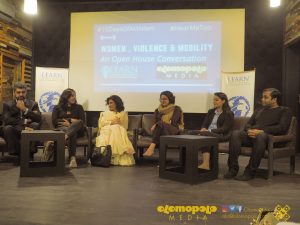
The session was moderated by Nida Usman Chaudhary, founder of LEARN who in her introduction laid down the issue in its context and spoke of challenges to mobility in the wider environmental context also, suggesting that if an enabling and safe environment were to be created in the country it would add to raising the standard of living and improve air quality as well. Making cities safe for women therefore, had wider implications as the issue was connected to creation of an overall environment that is sustainable.
She said, “In making safe cities for women, we end up making safe, progressive and efficient communities for all”.
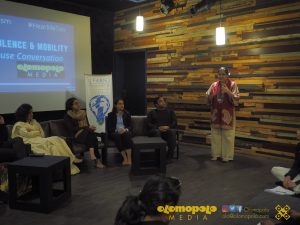
Rafay Alam then initiated the conversation by explaining how mobility was actually an entrenched right in the constitution under Article 15 (freedom of movement) but how that was currently being interpreted very narrowly in context of Exit Control List only. In Pakistan, women are forced to work to make ends meet. He highlighted that there were staggering cases of assault on women during commute but that nothing was ever done to make the space any safer for women. The numbers of violence and reported cases only keeps rising every year. He recounted the harrowing Delhi Bus Rape incident that jolted the world and added that no country can progress if half of its population cannot go out and access work, healthcare, education and other services because of a disabling environment.
Aneeqa shared her harrowing incident of harassment and assault she faced when she decided to go out cycling on her own in Lahore in 2016. She explained that the reason it was so easy for the perpetrators to knock her over was because they knew they could and would get away with it and they did. She also highlighted how she faced secondary harassment at hands of people on social media who would resort to blaming her for the incident by suggesting that she should not have gone out cycling alone in the first place. This type of victim blaming is exactly what causes shrinking spaces for women in public sphere in the first place. She expressed that even though she received a lot of support, it was comments like these that propelled her to continue to talk about her experience so that more awareness can come and women can access their right to be.
She further stated that, “no one is going to come and give us this right, we have to take it ourselves” and added that, “those who take the initiative often face the repercussions, but they are the ones who pave the way for others.”
She also spoke how her travel business was breaking stereotypes in this regard as adventure travel in Pakistan has not seen many female entrepreneurs in the lead. However, she explained that her being at the helm of the affairs encourages more women to sign up for the trips because they feel more comfortable in the thought that a woman is organising it. She plans to develop capacity of more women tour guides and reclaim space for women in the tourism industry.
Aysha didn’t start cycling as an activist but simply because it made more sense to her as a mode of transportation given her experience of living abroad. She felt she was more connected to the community she lived in and was actually looked upon with reverence by the street vendors and guards on her regular route who appreciated her courage and related seeing her on the same transport as in use by them. Her being on a cycle sent a message of equality. She made a very interesting observation about urban cities whilst contrasting them with ‘mohallas’ and stated that, “the higher the walls of our homes, the more dangerous the city is because you are not engaging with your environment at all.”
Aysha shared that she stopped cycling mainly because of dangerous air quality and unsafe roads highlighting a bigger challenge re mobility in the country. “The ‘car raaj’ and the signal free corridor stopped me from cycling because it became too dangerous. I stopped cycling not because I was a woman, but because as a cyclist, as a person on a bike, I had no road equity” she said.
Noor Rahman shared how she was perturbed by women not being able to be out on the streets and just relaxing or just existing. She noticed that women in Pakistan would use the streets only to commute from point A to B but never for recreational purposes unlike men who are often seen loitering around ‘dhabas’ and other open spaces.
“Why can’t you just go and exist?” she questioned.
This thought led her to explore what opportunities prevailed in the society for women to be in public spaces and she was introduced to ‘girls at dhabas’ who had a lot in common in terms of their concern for lack of access to women in public spaces. They therefore, decided to hold public rallies under the ‘girls on bikes’ initiatives to reclaim public spaces for women. They have hosted three rallies so far and the number of participants has gone from 30-40 in the first year to 70-80 in the last rally they held.
She closed her comments by highlighting the negative role the media plays in projecting them as ‘manchali larkiyan’ whenever these rallies are covered in the press. She requested the media to play a more responsible role towards reporting and creating awareness so that the message in its true sense can be carried forward in the dignity with which it ought to be viewed.
From minor challenges such as figuring out what to wear, to how to reclaim the right for women to be in public space to just be and enjoy that experience, these women are breaking all stereotypes and glass ceilings. They now expect their male counterparts to stand in solidarity with their right to a safe space and to approach any violence being perpetrated with zero tolerance policy and to start with calling it out wherever it is seen.
The study by Centre for Economic Research and Practice (CERP) is most interesting as it explores how improving mobility can increase participation of women in labour force. Their work was represented by Uzair Junaid who discussed the findings of their study in depth. The many respondents that they interviewed revealed that mobility was a significant factor hampering their access to workforce and that they would be more willing to work if they had such an access.
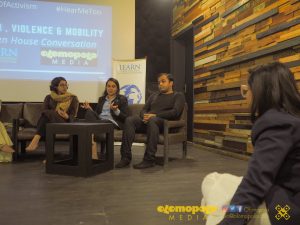
Uzair said, “availability of transport increases the chances of women joining the labour force. We could double the number of women who can work by ensuring their right of mobility.”
The pink bus alone was not a viable option because there were not enough passengers to fill the bus to its viable capacity and recommended that in place of that smaller vans could probably be promoted as women only transport to encourage participation of women in workforce.
Although, harassment was not significantly covered in their research, it is believed to be a strong factor in hampering access to public transportation so there was a clear need to have a fix bus schedule with proper route maps so that women spend less time waiting for busses at the stops. The bus stops need to be made safer by providing proper lighting and security.
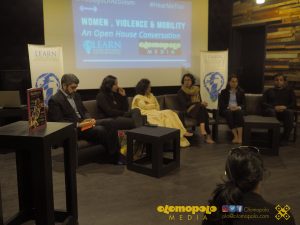
In continuation of the same thought, Fatima Khalid highlighted the importance of their women on wheels campaign to suggest how important it was for women to have access to this mode of transportation that the lower and middle class in Pakistan was a majority user of. She shared that the first women safety audit revealed that 90% of the women felt unsafe during commute. The Government of Punjab therefore, was keen on taking ownership of the issue and provide a viable solution to the women. They had the vision to liberate women by providing them the freedom and independence by relying on their own mode of transportation instead of having to depend on their male relatives to go from one place to another.
This empowered women in more ways than one as they could now access work and colleges and other opportunities that were previously not opened to them. Great care was taken on their part to engage the traffic police Lahore in imparting the training to use the motorcycles in association with Honda Atlas who also agreed to provide after sale service to the women trained under this programme.
A member of the audience questioned where the women on bikes and on wheels go after the one day of the rally that they are seen participating in and how can this become a regular accepted mode of transport for women in Pakistan. The panellists were keen on asserting that change is gradual and slow but conversations and efforts like these should continue to change that mind-set.
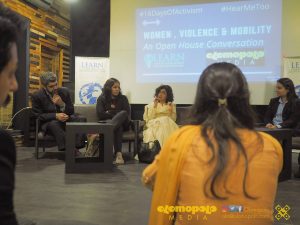
The audience also highlighted that there was a need to integrate the various transportation options existing in Pakistan because they all operate in alienation and often in competition with each other, unlike in Dubai where feeder busses take passengers from housing societies and other vicinities to metro stations which is then further inter-connected to other main shopping, educational, cultural, medical and other important points in the city, from where additional transport such as taxis may be easily accessed and explored.
With initiatives like ‘girls on bikes’ and Punjab government’s ‘women on wheels’ the capacity and reclaiming of roads has begun but all participants and even members from audience agreed that more work on changing the perceptions and mind set of the population was still left to be desired. Aysha suggested that one way to make way for road equity was to start by celebrating car free days within the year.
It was encouraging to see the participation by men in this dialogue who had come forward to learn about these initiatives because they want their daughters to be a part of an inclusive society.
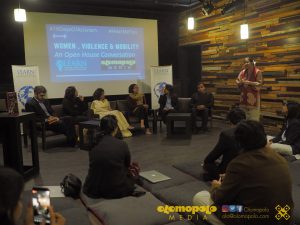
We would like to thank all panellists and members of audience for attending the session and making it so engaging and insightful. We would also like to express our gratitude for Olomopolo Media for hosting our talks and to Vicky for the official photographs.
For comments and feedback please write to us at info@learnpak.com.pk




